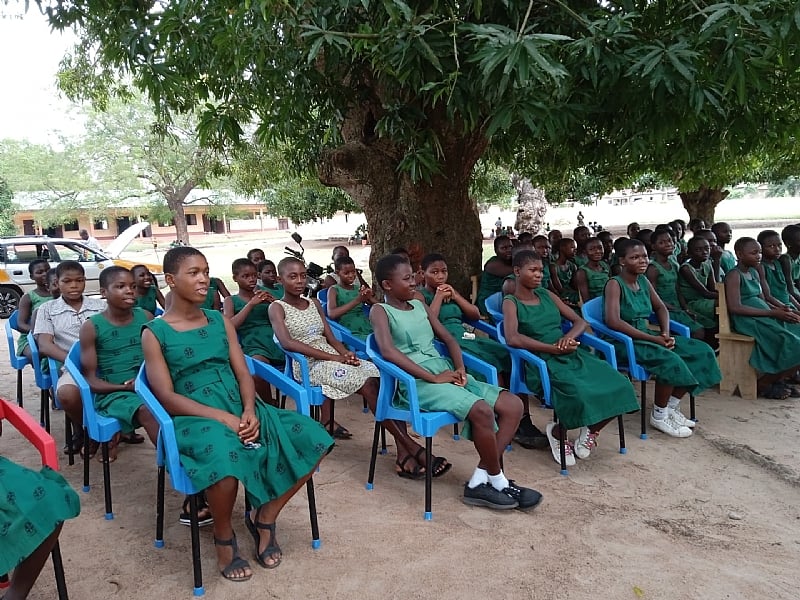Roberta Donkor, the Manageress of the Amenuveve SIV Organization, has urged young girls to embrace menstruation rather than feel ashamed of it, viewing it as a significant aspect of womanhood. This message was conveyed during an engagement with students from Adaklu Torda D/A Basic School and Adaklu Kpodzi E.P Junior High School in the Adaklu District, coinciding with the celebration of the International Day of the Girl Child on October 11, 2024. Ms. Donkor shared her personal journey, recalling how her mother supported her through her first menstruation, and encouraged the students to feel comfortable discussing their sexual and reproductive health with their parents and female teachers. This perspective aims to promote open communication and normalize the conversation surrounding menstrual health.
Central to the session was an emphasis on the importance of personal hygiene throughout the menstrual cycle. Ms. Donkor highlighted various hygienic practices that should be adopted, including regular bathing, changing menstrual pads frequently depending on flow intensity, and understanding pre-menstrual symptoms to better prepare for each cycle. The session also included an interactive component where the girls were encouraged to voice their inquiries about reproductive health rights, creating a safe space for open dialogue. This engagement sought not only to educate but also to empower the girls with knowledge about their bodies and health, emphasizing that menstruation is a natural process that should not be associated with stigma.
Madam Ivy Bedy, an advisory board member at Volta Pad—an organization that produces reusable sanitary pads—further enriched the discussion by addressing the importance of focusing on education and adopting healthy lifestyles. She warned against the pitfalls of early sexual activity, which can lead to unintended pregnancies and distract from academic pursuits. Aligned with the theme “Girls’ Vision for the Future,” Madam Bedy underscored the significance of initiatives such as the Affirmative Action Bill in Ghana, which aims to create better opportunities for girls. She encouraged the students to take their studies seriously, ensuring they understand that these opportunities are designed to facilitate their future successes.
Moreover, Madam Bedy addressed the reality many girls face regarding pregnancy. For those already dealing with this situation, she urged them not to view it as an endpoint to their education or resort to unsafe abortion methods. Instead, she encouraged them to seek guidance from teachers and Girl Child Coordinators, offering reassurance that support is available from parents and counselors to help them continue and complete their education. This compassionate approach aims to reinforce the idea that difficulties can be overcome with the right support and resources, fostering an environment conducive to resilience and hope.
During an interview, Juditha Mortey, the Girl Child Coordinator of Adaklu Kpodzi E.P Junior High School, shed light on the challenges many girls face, notably the lack of access to menstrual pads. This scarcity often forces them to resort to using inadequate alternatives, like tissue paper, which can pose risks to their health and wellbeing. Additionally, the financial burdens many parents face in providing for their daughters can exacerbate issues like teenage pregnancies in the community. Ms. Mortey called upon various stakeholders and organizations to step in and provide essential resources such as menstrual pads and school supplies. This plea highlights the critical need for community support systems to assist young girls in managing their menstrual health effectively.
In a show of solidarity and advocacy, one student named Fortunate proposed a campaign for donations of Volta Pads to distribute to girls at her school. Her initiative exemplifies the proactive steps that young people can take to address their needs and support their peers. It demonstrates a commitment to fostering a supportive community where access to proper menstrual care is prioritized. Fortunate’s suggestion to procure menstrual supplies underscores the collective responsibility of both individuals and organizations in ensuring that all girls have the resources necessary to manage their menstruation safely and with dignity, ultimately enabling them to pursue their educational aspirations.
Together, these insights from the session not only highlighted the importance of education regarding menstrual health but also underscored the broader societal implications of supporting girls during critical phases of their development. By encouraging open communication, advocating for resources, and fostering resilience, the efforts of figures like Roberta Donkor and Ivy Bedy contribute positively to the empowerment and well-being of young girls in the Volta Region and beyond.


